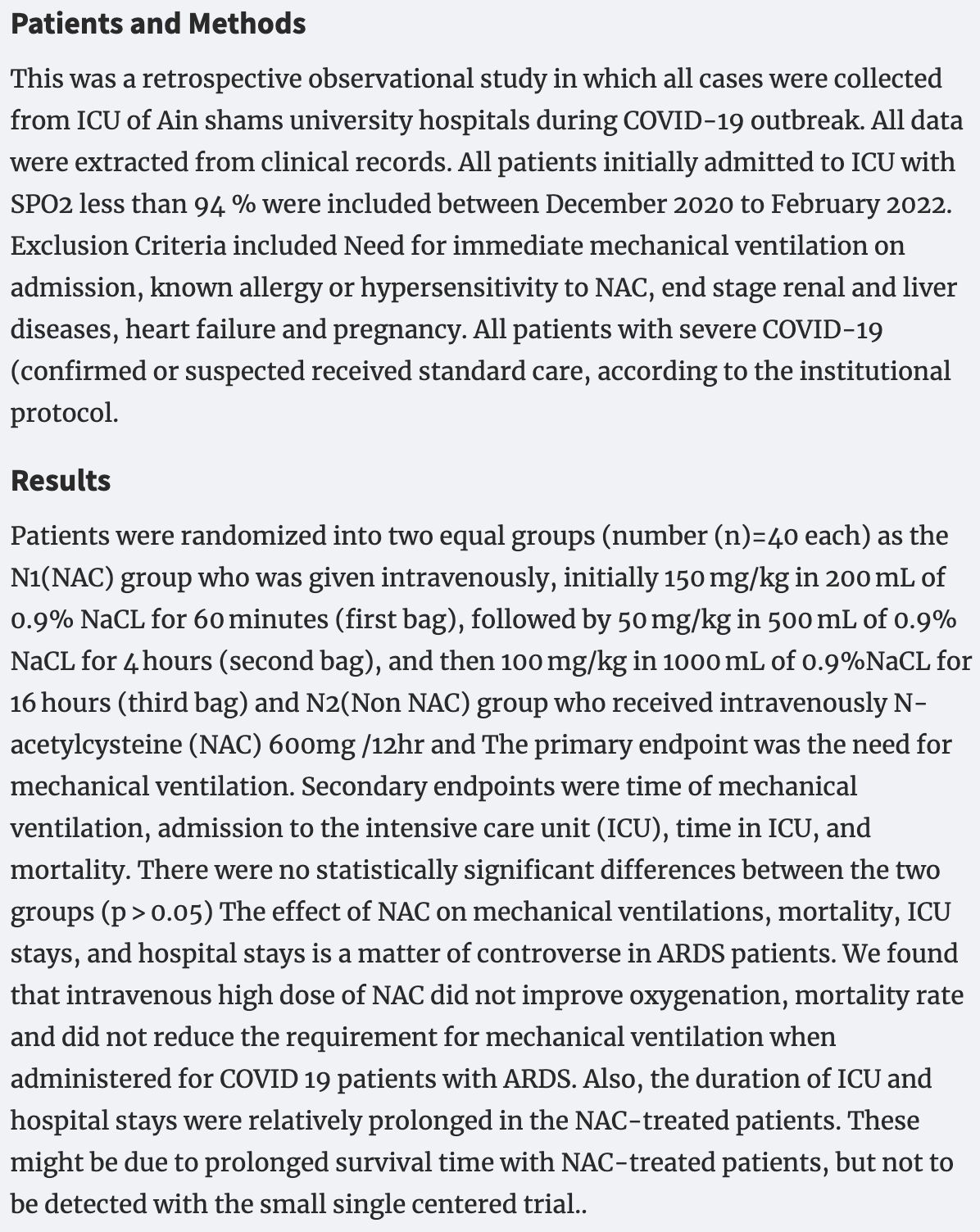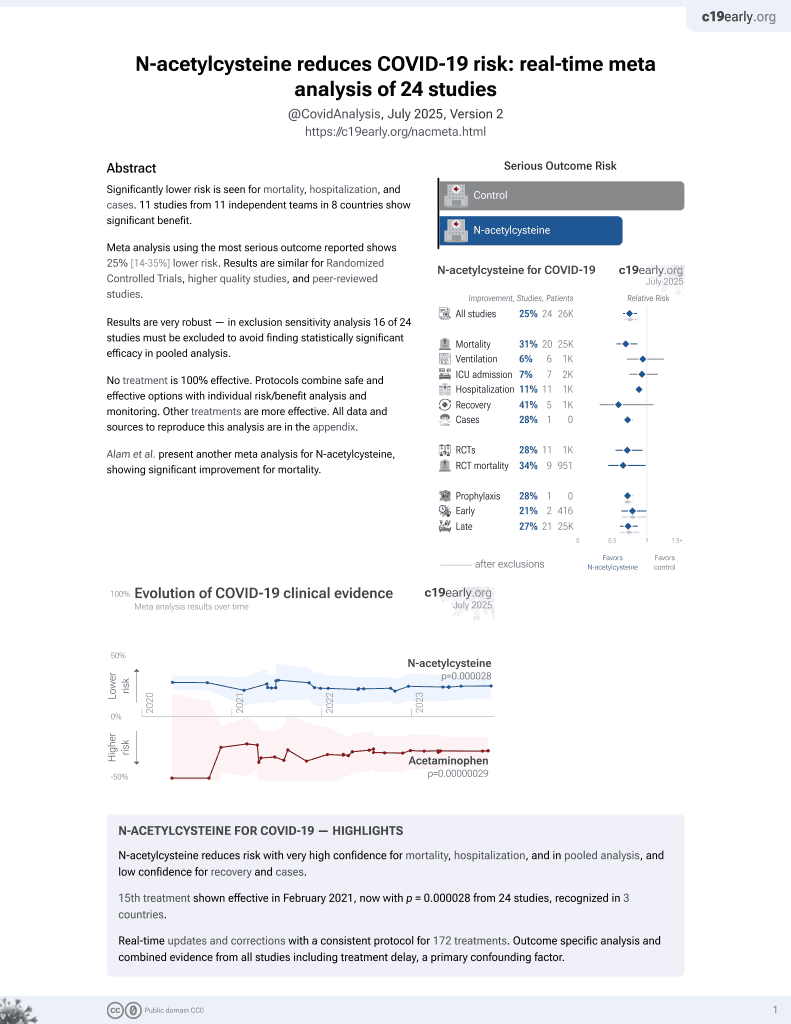
Safety and Efficacy of N-Acetylcysteine as an Adjuvant Therapy in Critically Ill COVID-19 Patients
et al., QJM: An International Journal of Medicine, doi:10.1093/qjmed/hcae070.076, Jun 2024
16th treatment shown to reduce risk in
February 2021, now with p = 0.0000032 from 25 studies, recognized in 3 countries.
No treatment is 100% effective. Protocols
combine treatments.
6,400+ studies for
210+ treatments. c19early.org
|
Retrospective 80 ICU patients reporting no statistically significant differences with NAC treatment, however the actual results are not provided. The study is described as a retrospective observational study however authors also state that "patients were randomized into two equal groups". The "Non NAC" group also received NAC - the study compares high dose treatment over 21 hours versus low dose ongoing treatment.
Abdelmonem et al., 1 Jun 2024, retrospective, peer-reviewed, 4 authors, study period December 2020 - February 2022.
DOI record:
{
"DOI": "10.1093/qjmed/hcae070.076",
"ISSN": [
"1460-2725",
"1460-2393"
],
"URL": "http://dx.doi.org/10.1093/qjmed/hcae070.076",
"abstract": "<jats:title>Abstract</jats:title>\n <jats:sec>\n <jats:title>Background</jats:title>\n <jats:p>COVID-19 may cause pneumonia, acute respiratory distress syndrome, cardiovascular alterations, and multiple organ failure, which have been ascribed to a cytokinestorm, a systemic inflammatory response, and an attack by the immune system. Moreover, an oxidative stress imbalance has been demonstrated to occur in COVID- 19 patients. N- Acetyl-L-cysteine (NAC) is a precursor of reduced glutathione (GSH).</jats:p>\n </jats:sec>\n <jats:sec>\n <jats:title>Aim of the Work</jats:title>\n <jats:p>we retrospectively will investigate safety and efficacy of NAC dose given in paracetamol toxicity as an adjuvant therapy in critically ill COVID-19 patients with acute respiratory distress and determine whether NAC in high doses can avoid respiratory failure in patients with COVID-19.</jats:p>\n </jats:sec>\n <jats:sec>\n <jats:title>Patients and Methods</jats:title>\n <jats:p>This was a retrospective observational study in which all cases were collected from ICU of Ain shams university hospitals during COVID-19 outbreak. All data were extracted from clinical records. All patients initially admitted to ICU with SPO2 less than 94 % were included between December 2020 to February 2022. Exclusion Criteria included Need for immediate mechanical ventilation on admission, known allergy or hypersensitivity to NAC, end stage renal and liver diseases, heart failure and pregnancy. All patients with severe COVID-19 (confirmed or suspected received standard care, according to the institutional protocol.</jats:p>\n </jats:sec>\n <jats:sec>\n <jats:title>Results</jats:title>\n <jats:p>Patients were randomized into two equal groups (number (n)=40 each) as the N1(NAC) group who was given intravenously, initially 150 mg/kg in 200 mL of 0.9% NaCL for 60 minutes (first bag), followed by 50 mg/kg in 500 mL of 0.9% NaCL for 4 hours (second bag), and then 100 mg/kg in 1000 mL of 0.9%NaCL for 16 hours (third bag) and N2(Non NAC) group who received intravenously N-acetylcysteine (NAC) 600mg /12hr and The primary endpoint was the need for mechanical ventilation. Secondary endpoints were time of mechanical ventilation, admission to the intensive care unit (ICU), time in ICU, and mortality. There were no statistically significant differences between the two groups (p &gt; 0.05) The effect of NAC on mechanical ventilations, mortality, ICU stays, and hospital stays is a matter of controverse in ARDS patients. We found that intravenous high dose of NAC did not improve oxygenation, mortality rate and did not reduce the requirement for mechanical ventilation when administered for COVID 19 patients with ARDS. Also, the duration of ICU and hospital stays were relatively prolonged in the NAC-treated patients. These might be due to prolonged survival time with NAC-treated patients, but not to be detected with the small single centered trial..</jats:p>\n </jats:sec>\n <jats:sec>\n <jats:title>Conclusion</jats:title>\n <jats:p>Use of high doses of NAC administration can not affect the need of mechanical ventilation, rate of mortality, the need, duration of ICU admission and hospital stays for patients with severe COVID-19.</jats:p>\n </jats:sec>",
"author": [
{
"affiliation": [
{
"name": "Intensive Care Department, Faculty of Medicine, Ain Shams University"
}
],
"family": "Abdelmonem",
"given": "Hany Saeed",
"sequence": "first"
},
{
"affiliation": [
{
"name": "Intensive Care Department, Faculty of Medicine, Ain Shams University"
}
],
"family": "Allah Elgendy",
"given": "Hanaa Mohamed Abd",
"sequence": "additional"
},
{
"affiliation": [
{
"name": "Intensive Care Department, Faculty of Medicine, Ain Shams University"
}
],
"family": "Kamal El-Din",
"given": "Doaa Mohammed",
"sequence": "additional"
},
{
"affiliation": [
{
"name": "Intensive Care Department, Faculty of Medicine, Ain Shams University"
}
],
"family": "Elshaer",
"given": "Eman Mohamed",
"sequence": "additional"
}
],
"container-title": "QJM: An International Journal of Medicine",
"content-domain": {
"crossmark-restriction": false,
"domain": []
},
"created": {
"date-parts": [
[
2024,
7,
3
]
],
"date-time": "2024-07-03T15:11:22Z",
"timestamp": 1720019482000
},
"deposited": {
"date-parts": [
[
2024,
7,
3
]
],
"date-time": "2024-07-03T15:11:27Z",
"timestamp": 1720019487000
},
"indexed": {
"date-parts": [
[
2024,
7,
4
]
],
"date-time": "2024-07-04T00:23:57Z",
"timestamp": 1720052637169
},
"is-referenced-by-count": 0,
"issue": "Supplement_1",
"issued": {
"date-parts": [
[
2024,
6,
1
]
]
},
"journal-issue": {
"issue": "Supplement_1",
"published-online": {
"date-parts": [
[
2024,
7,
3
]
]
},
"published-print": {
"date-parts": [
[
2024,
7,
3
]
]
}
},
"language": "en",
"license": [
{
"URL": "https://academic.oup.com/pages/standard-publication-reuse-rights",
"content-version": "vor",
"delay-in-days": 0,
"start": {
"date-parts": [
[
2024,
6,
1
]
],
"date-time": "2024-06-01T00:00:00Z",
"timestamp": 1717200000000
}
}
],
"link": [
{
"URL": "https://academic.oup.com/qjmed/article-pdf/117/Supplement_1/hcae070.076/58413542/hcae070.076.pdf",
"content-type": "application/pdf",
"content-version": "vor",
"intended-application": "syndication"
},
{
"URL": "https://academic.oup.com/qjmed/article-pdf/117/Supplement_1/hcae070.076/58413542/hcae070.076.pdf",
"content-type": "unspecified",
"content-version": "vor",
"intended-application": "similarity-checking"
}
],
"member": "286",
"original-title": [],
"prefix": "10.1093",
"published": {
"date-parts": [
[
2024,
6,
1
]
]
},
"published-online": {
"date-parts": [
[
2024,
7,
3
]
]
},
"published-other": {
"date-parts": [
[
2024,
6,
1
]
]
},
"published-print": {
"date-parts": [
[
2024,
7,
3
]
]
},
"publisher": "Oxford University Press (OUP)",
"reference-count": 0,
"references-count": 0,
"relation": {},
"resource": {
"primary": {
"URL": "https://academic.oup.com/qjmed/article/doi/10.1093/qjmed/hcae070.076/7705150"
}
},
"score": 1,
"short-title": [],
"source": "Crossref",
"subject": [],
"subtitle": [],
"title": "Safety and Efficacy of N-Acetylcysteine as an Adjuvant Therapy in Critically Ill COVID-19 Patients",
"type": "journal-article",
"volume": "117"
}
